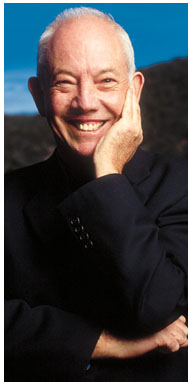External Professor, Santa Fe Institute
and Visiting Researcher, SRI International
W. Brian Arthur is an economist and complexity scientist. He is best known for his work on network effects locking markets in to the domination of a single player. He is also one of the pioneers of the science of complexity—the science of how patterns and structures self-organize. He is a member of the Founders Society of the Santa Fe Institute and in 1988 ran its first research program. He has served on SFI's Science Board for 18 years and its Board of Trustees for 10 years, and is currently External Professor at SFI.
Arthur held the Morrison Chair of Economics and Population Studies at Stanford from 1983 to 1996. He has degrees in operations research, economics, mathematics, and electrical engineering. Arthur is a well-known keynote speaker.
Research
Brian Arthur is known for several sets of ideas:
Increasing returns. In the 1980s Arthur developed a way for economics to understand how increasing returns or positive feedbacks (e.g. network effects) operate in the economy — in particular how they can magnify small, random events and act to lock in dominant players. This work has gone on to become important to our understanding of the high-tech economy.
Complexity economics. In the late 1980s, Arthur led a group at the Santa Fe Institute to develop an alternative approach to economics—"complexity economics." Standard economics is based on the idea of super-rational actors operating in a static equilibrium world; complexity economics assumes actors in the economy do not necessarily face well-defined problems or use super-rationality. They explore, try to make sense, react and re-react to the outcomes they together create. The economy is not in stasis but always forming, always "discovering" fresh novelty. In this non-equilibrium view of the economy, bubbles and crashes can happen, markets can be "gamed" or exploited, and history and institutions matter.
How technology evolves. In 2009, Arthur published The Nature of Technology: What it Is and How it Evolves. The book is a theory of evolution for technology. It argues that technology, like biological life, evolves from earlier forms. But the main mechanism isn't Darwin's, it is the combining of earlier technologies—earlier forms—to make new technologies. The book explores in detail how this evolution works. And it argues that economy isn't just a container for its technologies; the economy emerges from its technologies.
Google Scholar Citations for W. Brian Arthur
Awards
Arthur was awarded the inaugural Lagrange Prize in Complexity Science in 2008, and the Schumpeter Prize in Economics in 1990. He is a Guggenheim Fellow, 1987-88, Fellow of the Econometric Society, and IBM Faculty Fellow. He holds honorary doctorates from the National Univ. of Ireland (Galway) 2000, and Lancaster University (UK) 2009. He is a 2019 Citation Laureate, (an award made annually by Web of Science to “researchers of Nobel Class.”)
Books
Complexity and the Economy, Oxford University Press, 2015.
The Nature of Technology: What it Is and How it Evolves, Simon & Schuster, 2009.
Complexity Economics: Proc. of Applied Complexity Network, ed. with Eric Beinhocker and Alison Stanger, Santa Fe Inst. Press, 2021.
The Economy as an Evolving Complex System II, edited with Steven Durlauf and David Lane, Addison-Wesley, 1997
Increasing Returns and Path Dependence in the Economy, University of Michigan Press, 1994
